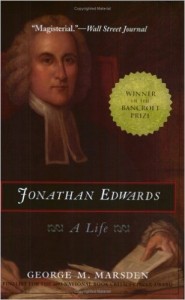 Review – Jonathan Edwards, A Life
Review – Jonathan Edwards, A Life
George M. Marsden
Yale University Press, pbk, 615 pp.
This is a massive tome, but important, concerning as it does one of the Christian Church’s deepest thinkers. Edwards was a profound intellect, a powerful writer, and a moving and effective preacher. In his own day, he was respected, and was prominent amongst the ministers of New England. But it is only since his death that his true significance has come to be appreciated.
There is real irony here: Edwards wrote his works in makeshift notebooks of scrap paper carefully saved and sewn together by his wife or daughters, with incidental biographical clues able to be drawn from the details of the bills and receipts thus preserved. But the humble jottings preserved in this form are now prized, and have been carefully transcribed and published in whole by Yale University Press in their massive, 26-volume collection of the works of Edwards.
Marsden has undertaken an immense task of research in this work, and yet deserves credit for the narrative he has produced. Written with pace and vigour, the book sustains interest throughout, while the wealth of additional detail in endnotes and appendices is available for the future researcher.
A number of major themes run through the text: chief among them is danger, for Edwards lived in a frontier province, within reach of hostile Indians, and the dominions of the French Empire, with which British America was frequently at war. The fragility of life is also key, when death was all around, and could strike at any time, for young and old alike. Also central are themes of family and hierarchy, as Edwards was a part of the aristocracy of New England society, was part of the tightly interwoven network of ‘river god’ families that governed the settlements along the Connecticut, and was deeply invested in the preservation of social order and stratification.
But the most vital theme of Edwards’ life was revival, something that he experienced powerfully in the First Great Awakening. It is particularly interesting to see how Edwards’ advocacy for the Awakening actually served to undermine the stability of his society, breaking up the homogeneity of New England religion into competing denominations, and turning many of the leading families against him and his ministry. Revival usually brings negative as well as positive consequences, ugly manifestations as well as appealing ones, and this is rarely made clearer than in this narrative. The Awakening stirred the dry bones of New England Calvinism, but also created the intellectual ferment in which the liberal teachings imported from the European Enlightenment could prosper.
Yet Edwards remained convinced that revival was the urgent need of the world. To a cautious and sceptical society, he defended revival and described what its personal effect would be when rightly received. This was achieved in his major treatise on experimental religion, The Religious Affections, as well as in his descriptive accounts of the progress of revival in his own congregation. He emphasized the ideal of personal devotion in his memoir of his friend David Brainerd.
This ideal inspired his powerful and intense preaching, known for the unrestrained vigour of his descriptions of the joys of Heaven and of the horrors of Hell. These descriptions, always carefully grounded in Scriptural exegesis, underlined the passionate urgency of his appeals to his hearers to embrace the Gospel, and to seek lives of personal holiness. No hypocrite, he set himself a demanding personal standard, and excoriated himself for his own failings.
Sadly, it was this very standard of uncompromising dedication to revealed truth that led to his greatest trial: when he informed his congregation in Northampton that he could no follow the prior practice of allowing the general population to enter membership of the church without evidence of personal spiritual change. His subsequent ejection, forcing his departure to the small frontier settlement of Stockbridge, was a painful but very necessary stand for the purity of the sacramental table.
Edwards had, of course, his blind spots, including a particular fascination with apocalyptic speculation, which led him to some dubious conclusions. In particular, he believed that the Awakening was the dawning of the final Millenium of God’s favour, rather than being merely a welcome but very localized time of blessing. He assigned dates for prophetic fulfillment, which subsequent events have sadly disproved. He also followed news from Europe obsessively, believing he could discern signs of the coming fall of the Papal Antichrist in what, in retrospect, seem insignificant vicissitudes of political history.
But transcending all Edwards’ errors, and all his contemporary achievements, was his theological vision, powerfully communicated at a popular level in his published sermons, and at an academic level in his substantive philosophical treatises. His theology was undoubtedly still the orthodox Calvinism of his Puritan forebears, but Edwards expressed this theology as a modern worldview, in the Enlightenment context of reasoned argument and scientific inquiry. Using the Biblical texts as his raw data, and rigorous exegesis and reasoned argument as his method, Edwards presented the sovereignty of God as the defining fact of existence. He discussed the love of God as His defining attribute, and as the reason for the creation of the world itself, and argued that His love will triumph in the eventual conversion of the overwhelming majority in the coming days of millennial blessing, to His eternal glory, and His people’s eternal happiness.
In 1757, Edwards accepted the Presidency of the fledgling College of New Jersey, later Princeton University. In a poignant end to his life, he underwent vaccination against smallpox, but went on to contract the dreaded disease, and succumbed on 22 March 1758, aged just 54. Marsden’s life is an excellent tribute, a fine work of research, and a great starting point to benefit from Edwards himself.


Leave a Reply